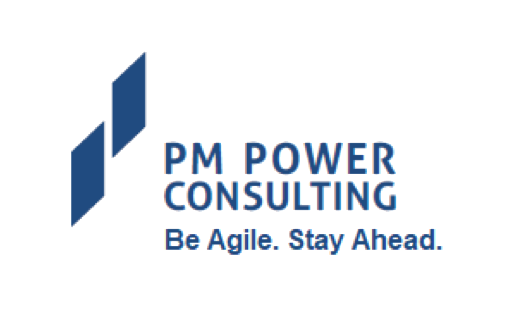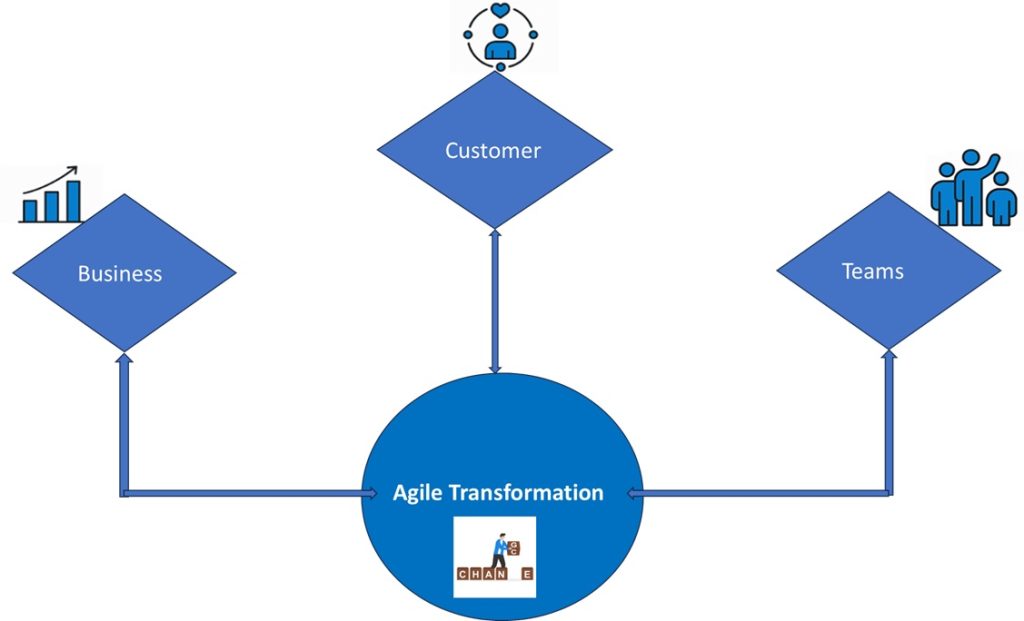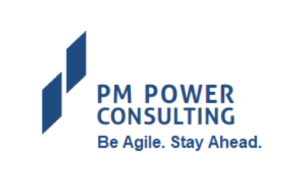In previous posts, I had shared the technology and process trends. One common theme across the two is related to better teamwork and collaboration across organizational silos.
In this post, I want to share three significant concepts that, when combined with the technology and process patterns, can help you achieve sustainable results.
Yes, these are related to people – who are the key enablers of knowledge systems.
Self organizing intrapreneurship:
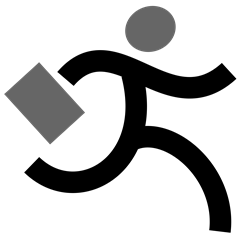
The first key trait to nurture in your teams is to work with an entrepreneurial spirit. This is simpler said than done. Every team member needs to be fearless and comfortable sharing their ideas and concerns with others in the team as well as outside.
The emphasis is to keep the customer and users in focus always and be aware of how their contributions will make a difference and create a WOW experience.
Agile approaches and the DevOps culture emphasize this as an essential value.
Staying focused on the goal, avoiding distractions including changing work / task priorities that are more internal to the team and organization will help in ensuring that individuals can make commitments that they can meet and also actually achieve them.
Entrepreneurial thinking has multiple dimensions. Some of them are:
- Creative problem solving : Empathy with customers
- Working based on the ant philosophy
- Never give up: Ants never quit
- Look ahead: Think Winter during Summer and vice versa, to plan for the future
- Stay positive: Setbacks are only temporary
- Do all you can: And leverage your team
- Constant learning
The second concept is knowledge management
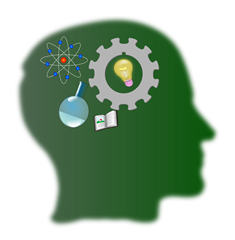
It is a common misconception to consider a repository of documents as the Knowledge Management strategy.
Documents help, but that cannot be the only way to retain and reuse knowledge. Going by the most popular model of Data-Information-Knowledge-Wisdon hierarchy, many times, documents remain at the data level.
They may, sometimes, also capture the context clearly and offer pointers to extrapolate or interpret the data in the seeker’s situation. Such information still needs to be transformed into knowledge. To do that, it is essential that there is some ambiguity in the information, but with indications of possible connections to related pieces of information. Advancing technologies related to machine learning and predictive models will make it easier to synthesize nuggets of data and information to cull out contextual knowledge.
But, unless there is participation of the people, both in the creation and consumption, the collective knowledge cannot be harnessed for the team wisdom.
In the knowledge era, where insights are the currency to customer intimacy, teams that understand the customer and the environment in which they need to be successful will have a greater chance of creating more value in their contributions.
So, knowledge management needs to be treated as a team process and in some of the good organizations, this is very closely aligned with the HR practices that encourage team goals, team performance recognition etc.
Interactions – formal and informal – need to be encouraged. Both horizontal as well as vertical channels of communication need to be encouraged.
When a team is able to draw upon the collective wisdom, their ability to self-organize and adjust workloads with the goal in mind increases.
Having enabling technologies that facilitate collaborative work and also record conversations will automatically create archives of these discussions. For example, when, at a later time, someone else wants to understand the rationale for a design decision, the archives would come in useful.
Also, by extension, if the enabling platform can also help infer the problem area – maybe a memory leak – and help connect to the right expert, team productivity will increase multi fold.
This brings me to the overarching approach to people aspects: mindfulness
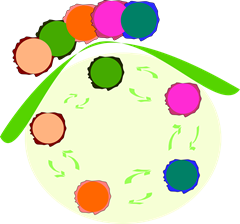
In order to achieve the best as teams, effective people processes become key.
Most of our education systems and also cultural upbringing groom us to become achievers. While that is not bad in itself, the emphasis is more on individual achievement. Whether it is in school, or reality shows on TV, It is usually about who scores more marks, who is the winner – in the top position etc etc etc.
In the software context, moving from programming in the small to programming in the large requires an expanded thinking approach. Getting the big picture, understanding upstream and downstream activities in the process are all approaches to help synthesize a comprehensive solution.
To synthesize, multiple, individual or smaller components are needed. In the team process, these are individuals.
For self organizing teams, every member is a potential leader, who could rise to demonstrate leadership qualities in specific situations. In every such instance, we find that a balanced approach to understanding not only the external situation, but also oneself makes a big difference in the effectiveness of the impact and outcome.
The concept of Emotional Intelligence, popularized by Daniel Goleman – based on an earlier work by Peter Salovey and John Mayer, is a practical approach to understand and apply the techniques to understand one’s own and other people’s emotions, even in the work context.
That is a good start. But, to get deeper, one has to look at three areas to constantly improve.
This graphic representation by Tanmay Vora explains it in a nutshell.
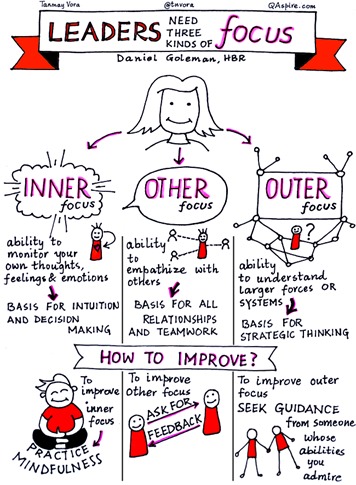
This video interview with Daniel Goleman by HBR explains the above in his own words.
Based on our own experience of helping individuals, teams and organizations become more effective, my colleague, Vishu Hegde, recently conceived and put together a two day session to ‘look inside yourself’ so that by managing the inside, becoming better at managing outside.
It is called LiKE – Leadership in the Knowledge Era and you can read more about it on our website.
To summarize, the three people practices that you should consider in 2016 are:
-
self organization and intrapreneurship
-
personal and team knowledge management
-
a mindful approach to managing oneself
image credits:
entrepreneur: https://openclipart.org/user-detail/tasper
teamwork : https://openclipart.org/user-detail/GDJ
knowledge: https://openclipart.org/user-detail/jabernal
mindfulness: https://openclipart.org/user-detail/cibo00
leadership focus: http://qaspire.com/2016/01/11/leaders-need-three-kinds-of-focus/
